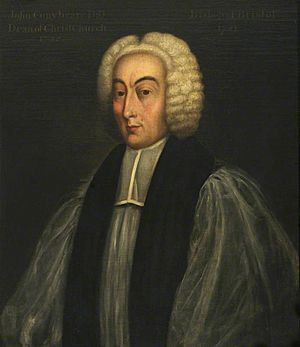John Conybeare facts for kids
Quick facts for kids The Right Reverend John Conybeare |
|
|---|---|
| Bishop of Bristol | |
 |
|
| Diocese | Diocese of Bristol |
| In Office | 1750–1755 |
| Predecessor | Joseph Butler |
| Successor | John Hume |
| Personal details | |
| Born | 31 January 1692 |
| Died | 13 July 1755 (aged 63) |
| Nationality | British |
| Denomination | Anglican |
| Alma mater | Exeter College, Oxford |
John Conybeare (born January 31, 1692 – died July 13, 1755) was an important religious leader and thinker in the 1700s. He became the Bishop of Bristol, a significant position in the Church of England. He was also known as one of the most notable theologians of his time. A theologian is someone who studies religion and religious ideas deeply.
Early Life and Education
John Conybeare was born in a place called Pinhoe, where his father was a vicar (a type of priest). He went to school at Exeter Free School and Blundell's School.
Later, he studied at Exeter College, Oxford University. In 1710, he became a "Probationary Fellow" at Exeter College. This meant he was a junior member of the college staff, learning and teaching. He earned his first university degree in 1713. A year later, he became a "Praelector in Philosophy," which means he taught philosophy.
Becoming a Priest
On May 27, 1716, John Conybeare became a priest. He was ordained by the Bishop of Winchester, Sir Jonathan Trelawney. After this, he took a "curacy" in Surrey. A curacy is a job as a helper priest in a church.
He returned to Oxford a year later. There, he became a well-known preacher, sharing his religious messages with many people.
Important Roles
John Conybeare held several important positions during his career:
- Rector of St Clement's Church, Oxford, starting in 1724. A rector is the main priest of a parish.
- Senior Proctor at Exeter College, Oxford, in 1725. This role involved helping to manage the university.
- Elected Rector of Exeter College, Oxford, in 1730. This was a very high position at his old college.
- Dean of Christ Church, Oxford, in 1733. This made him the head of one of Oxford's largest colleges.
- Bishop of Bristol, in 1750. This was a very important leadership role in the Church of England.
His Writings
Conybeare was known for writing a book called Calumny Refuted. This book was his response to personal slander (false and damaging statements) made against him by Dr. Richard Newton.
Family and Legacy
John Conybeare had a son named Dr. William Conybeare, who became a well-known rector in Bishopsgate. John Conybeare was also the grandfather of two notable people:
- John Josias Conybeare, who was an Anglo-Saxon translator and poet.
- William Conybeare, who became a famous geologist (someone who studies the Earth's rocks and history).
John Conybeare is buried in Bristol Cathedral.
 | Anna J. Cooper |
 | Mary McLeod Bethune |
 | Lillie Mae Bradford |

